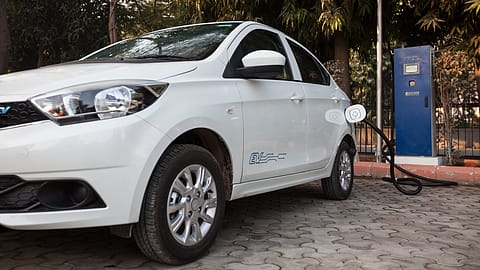100% clean fuel vehicles likely in India by 2043: Report
The impact of this transition, including a 91% reduction in crude oil consumption in the road transport sector, will amount to a cumulative savings of ₹160 lakh crore.

India can achieve 100% clean fuel vehicle sales (primarily electric) across road transport segments by 2043 and energy independence in the mobility sector by 2047, according to a recent roadmap vision document for the mobility sector.
The impact of this transition, including a 91% reduction in crude oil consumption in the road transport sector, will amount to a cumulative savings of ₹160 lakh crore ($1,923 billion) — a reduction from ₹263 lakh crore to ₹103 lakh crore worth of crude oil imports between 2024 and 2047. Further, the transition will result in a nearly 14-gigatonne reduction in cumulative carbon emissions, an 87% decrease compared to the progress-as-usual scenario in 2047, says 'India’s Energy Independence Roadmap - mobility sector', released by the global non-profit organisation RMI (Rocky Mountain Institute).
RMI analysis says that achieving the 2047 target of 100% EV adoption should happen in two- and three-wheeler segments by 2030, in four-wheelers and light goods vehicles by 2036, in buses by 2040 and in medium- and heavy-duty goods vehicles by 2043. Transitioning to energy independence for the mobility sector will require shifts in the economy and proactive policy to create a vehicle stock of 62.3 crore clean fuel vehicles on the road by 2047.
The report provides key recommendations and actions to transition the country to an electric, shared and energy-independent mobility system, including supply- and demand-side policies, innovative financing mechanisms and a circular economy for EV batteries. Making India’s road transport sector electric, shared, and independent of imported fossil fuels could cut the sector’s energy demand by 57% and carbon emissions by 87% by 2047.
"India's mobility sector, accounting for 18% of the country's energy demand, is making strong progress with 12.3 lakh EVs registered and a 7.6% sales penetration. India is fast becoming a global hub for 2-and 3-wheeler manufacturing, with momentum building rapidly," says Amitabh Kant, G20 Sherpa, Government of India in the report. To accelerate the speed and scale of India’s mobility revolution, focus and investment will be needed across infrastructure, policy support, skilling and R&D, says Sumant Sinha, chair of the RMI Board and chairman and CEO, ReNew. '"With India’s per capita primary energy consumption slated to double by 2047, the country is making remarkable strides in the energy transition through the adoption of clean technologies," he says.
On the demand-supply side, the report suggests introducing a zero-emissions-vehicle sales mandate, adopt progressive fuel economy norms, continue purchase subsidies, and disincentivise the use of high-emitting internal combustion engine (ICE) vehicles to drive the adoption of EVs and inspire both consumers and manufacturers. Another suggestion in the report is to set national targets for EV charging and battery swapping stations, define vehicle-to-charger and vehicle-to-swapping-station ratios, and create clear standards for charging and interoperability to ensure that EV infrastructure is accessible, affordable, and safe. Further, all EV charging and battery swapping infrastructure has to be powered by clean electricity by 2045.
The RMI report suggests India should develop a circular economy for EV batteries by ramping up collection, recycling, and second-life applications for EV batteries by enhancing the collection rates, offering incentives for investment in recycling infrastructure, and establishing guidelines for battery reuse. India also needs to develop a national strategy to position as a global manufacturing hub for EVs by 2040 and offer manufacturing assistance.